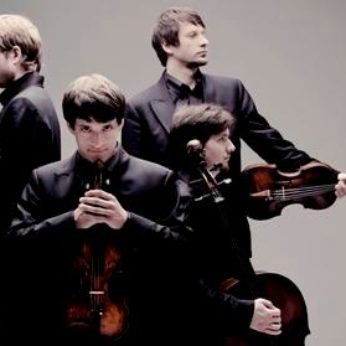Composer: Henryk Górecki (b. 1933 - d. 2010)
Performance date: 04/07/2012
Venue: Bantry Library
Composition Year: 1988
Duration: 00:17:11
Recording Engineer: Anton Timoney, RTÉ lyric fm
Instrumentation Category:String Quartet
Artists:
Apollon Musagète Quartet (Paweł Zalejski, Bartosz Zachłod [violins], Piotr Szumieł [viola], Piotr Skweres [cello]) -
[quartet]

I think that music is one of the
domains that people really need, and its importance only depends on
whether one knows how to receive it. Every person needs to be
prepared to know how to ‘use’ music. Not only music – also
literature, painting, sculpture, and film. Tarkowski said that art is
prayer. It is something that I also emphasize. But it is difficult to
understand: one has to mature to this thought.
This work last appeared in the Festival
in 2003 as our celebration of the composer’s 70th
birthday. Now nine years later we must mourn his passing in November
2010. This quartet is based on the melodic and programmatic ideas of
an early sixteenth century Polish hymn by Waclaw of Szamoutuly.
Already it is dusk and total darkness approaches. Let us ask God
for his care and protection. May He guard us against the spells of
the wicked, who are drawn by the dark void to wreak their vengeance.
The work is in three movements with a
coda, played without a break. The striking opening chord symbolises
the approach of darkness, immediately calmed by the prayer for God’s
protection. As the movement advances the chaos of night grows ever
closer, and the prayer becomes more insistent, and we realise that
the darkness may not be overcome. When night closes in –
ferocissimo and molto furioso – we are overwhelmed by
the terror that is unleashed. This music is inspired by the colours
and rhythms of Polish folk music – the harsh timbres and relentless
ostinati of the mountain dances from the Tatras.
Eventually the long night draws to an
end with a reprise of the opening, but now shorn of the sinister and
terrifying threat of chaos. Instead we have the comforting cadences
of the prayer that concludes with the quiet tolling of a bell, before
the coda’s tender and peaceful conclusion.
Copyright © 2025 West Cork Music. All rights reserved.
Designed and developed by Matrix Internet